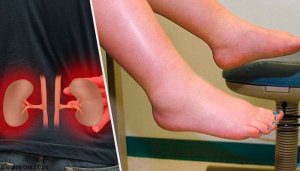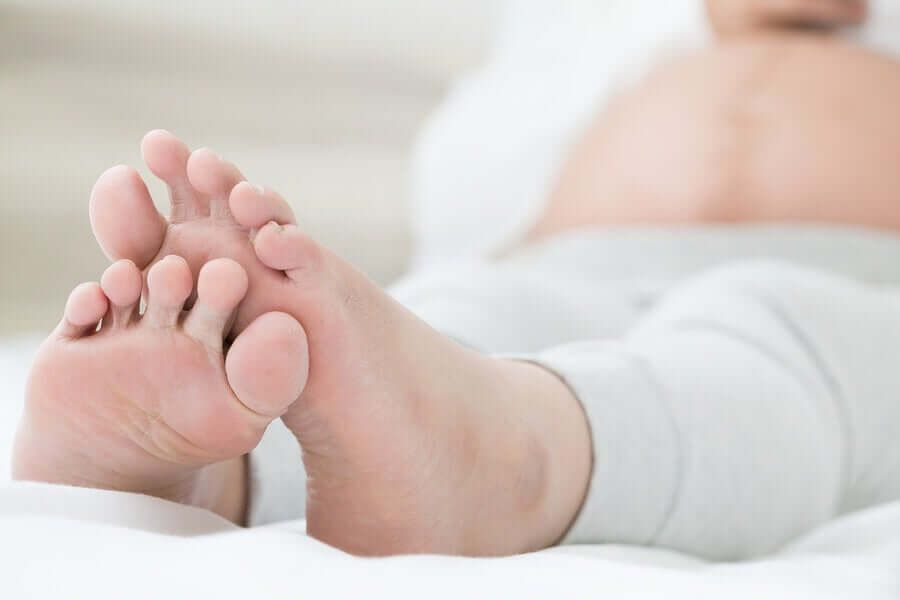Water Retention: What Causes It?


Written and verified by the doctor Nelton Abdon Ramos Rojas
Water retention affects many people, for various reasons and at different ages. Among the areas of the body that are most affected by this problem are the abdomen and the lower extremities (especially the ankles and feet).
In addition, it’s a very annoying ailment, capable of affecting people’s quality of life. When water doesn’t circulate and is deposited in the body, various problems begin to appear. Therefore, it’s advisable to know the causes of this disease to try to avoid it.
Causes of water retention
It can happen as a result of many factors. It’s often possible to see many people who are suffering from this problem. However, they may not know the reasons why, or have taken proper measures to prevent it.
It’s important to be able to identify the reasons so that you can seek the correct treatment. In this regard, it’s important to remember that it’s essential to avoid self-medication and changing habits without first consulting a professional.

Environmental factors
- Excess heat can cause fluid to come from the blood vessels without the tissues being able to absorb it all.
- Jobs in which you might spend a long time in the same position, as well as long journeys, where you’re sitting down for a long time, can cause a build-up of fluid.
Habit-related factors
- A diet which contains excess salt and little protein is the perfect combination for developing symptoms. An excess of sodium changes the process that regulates water in the body.
- Sedentary lifestyles, alcoholism, and smoking are among the main causes of fluid retention. Together, they’re a combination of high risk to a person’s health.
Hormonal causes
- Periods are generally accompanied by an increase in liquid retention. Because of this, women can spend many days with abdominal inflammation. Generally, there’s nothing you can do, but it’s a temporary situation.
- During pregnancy, women tend to suffer from fluid retention as a result of hormonal changes. It’s very common for pregnant women to get swollen feet, hands, and face.
Read also: How to Regulate Hormones through Exercise
Other illnesses
Cirrhosis makes it difficult for water to circulate through the liver. This causes fluid retention in the abdomen and lower extremities.
In view of all the above, it should be kept in mind that the main players in the regulation of body fluids are the kidneys and that any disorder in their function could lead to retention as well as other discomforts.

Both renal and cardiac insufficiency produce edema in certain areas, since fluids can’t move freely. As explained above, it’s the kidney that governs the elimination of fluids through urine. If this process is disturbed, the fluids will remain stagnant in some intermediate area, thus causing various problems.
You might also like: Incredible Natural Remedies to Cleanse Your Kidneys
Certain medications
Corticoid-based medication, some anti-inflammatories, or medications for treating illness such as diabetes can result in fluid retention as a side effect. Therefore, it ‘s essential to avoid self-medication and always consult a professional.
How to combat fluid retention?

If the fluid retention is a consequence of taking a drug, the doctor may prescribe a specific diuretic or a diet based on foods rich in water and with diuretic properties.
In addition, in general terms, the most advisable thing to do is to adopt or improve lifestyle habits. Among the changes we can make are abandoning a sedentary lifestyle, trying to exercise daily for at least 30-40 minutes, and also changing posture every 15 minutes (especially when it is necessary to remain in the same posture for several hours a day).
In some cases, the doctor may recommend the use of compression stockings or socks to minimize the discomfort caused by fluid retention.
Finally, we must always keep in mind that, beyond the changes that we can make in our habits, the first thing should always be to consult with the doctor.
All cited sources were thoroughly reviewed by our team to ensure their quality, reliability, currency, and validity. The bibliography of this article was considered reliable and of academic or scientific accuracy.
- Belczak, C. E. Q., Godoy, J. M. P., Seidel, A. C., Ramos, R. N., Belczak, S. Q., & Caffaro, R. A. (2015). Influência da postura prevalente de trabalho no edema ocupacional dos membros inferiores. Jornal vascular brasileiro, 14(2), 153-160. Available at: https://www.scielo.br/scielo.php?pid=S1677-54492015000200153&script=sci_arttext&tlng=pt. Accessed 07/05/2020.
- Marcotullio, D., Magliulo, G., & Pezone, T. (2002). Reinke’s edema and risk factors: Clinical and histopathologic aspects. American Journal of Otolaryngology, 23(2), 81–84. Available at: https://doi.org/10.1053/ajot.2002.30961. Accessed 07/05/2020.
- Flores-Villegas, B., Flores-Lazcano, I., & de Lourdes Lazcano-Mendoza, M. (2014). Edema. Enfoque clínico. Medicina interna de México, 30(1), 51-55. Available at: https://www.medigraphic.com/pdfs/medintmex/mim-2014/mim141g.pdf. Accessed 07/05/2020.
- Fundación Española del Corazón (2014). Soluciona la retención de líquidos. Available at: https://fundaciondelcorazon.com/blog-impulso-vital/2649-soluciona-la-retencion-de-liquidos.html. Accessed 07/05/2020.
- Romero, C. E. (2013). Disminución del consumo de sal en la población:¿ recomendar o no recomendar?. Revista Uruguaya de Cardiología, 28(2), 263-272. Available at: http://www.scielo.edu.uy/scielo.php?pid=S1688-04202013000200019&script=sci_arttext. Accessed 07/05/2020.
- Tacani, P., de Oliveira Ribeiro, D., Barros Guimarães, B. E., Perez Machado, A. F., & Tacani, R. E. (2015). Characterization of symptoms and edema distribution in premenstrual syndrome. International Journal of Women’s Health, 297. Available at: https://doi.org/10.2147/ijwh.s74251. Accessed 07/05/2020.
This text is provided for informational purposes only and does not replace consultation with a professional. If in doubt, consult your specialist.








